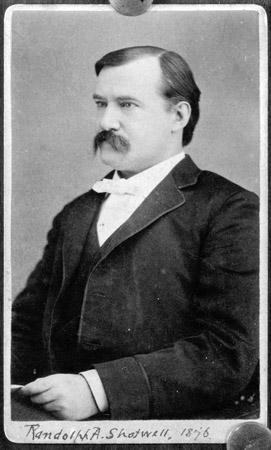14 Dec. 1844–31 July 1884

Randolph Abbott Shotwell, Confederate soldier, newspaperman, state legislator, and author, was born in West Liberty, Va., the eldest of three sons of the Reverend Nathan, a Presbyterian minister, and Martha Ann Abbott Shotwell. His mother was a native of Massachusetts and of a prominent family. A precocious youth, young Shotwell at age thirteen entered Tuscarora Academy, in Mifflin, Pa., where he remained until 1860, when he enrolled at Media College, Media, Pa.
With the beginning of the Civil War Shotwell left school and returned to Virginia to enlist in the Eighth Virginia Regiment. Under the command of Colonel Eppa Hunton, the unit participated in seventeen battles. Shotwell led the sharpshooters of the regiment in Pickett's Charge at Gettysburg and was promoted to lieutenant for his gallant conduct. He was captured in 1864 and confined as a prisoner for the remainder of the war—first at Point Lookout and then at Fort Delaware.
In 1865 Shotwell went to North Carolina, where his father had become pastor of a church at Rutherfordton in 1858. He soon moved to New Bern and with Stephen D. Pool established the Journal of Commerce, an unsuccessful newspaper. Falling victim to malaria, Shotwell returned to Rutherfordton and, at his father's urging, studied law for a brief time. His primary interests, however, were public affairs and writing; he ran unsuccessfully to become a delegate to the 1868 constitutional convention. In February 1868 he acquired the Rutherford Star , which he renamed The Vindicator . Conservative and Democratic, the newspaper reflected Shotwell's views and it attracted attention, although, like the New Bern paper, it proved to be financially unsound. Denouncing the Radicals with enthusiasm and effect, he became the target of Radicals in Cleveland and Rutherford counties. In 1869 he established the Citizen in Asheville but it, too, failed. The twenty-five-year-old Shotwell once more returned to his father's home and resumed the reading of law.
His political activities soon embroiled him with the Ku Klux Klan. Though never a member, he acted as a moderating force in an effort to modify the outrages being committed. His involvement with the Klan, however, provided his Radical enemies with an excuse, and he was arrested on 5 July 1871. Brought to trial in the senate chamber in Raleigh before a partisan judge and a carefully selected jury, Shotwell was convicted and sentenced to six years' confinement at Albany, N.Y., and fined $5,000. Offered an immediate pardon if he implicated leading Democratic politicians, Shotwell refused and was sent to the federal penitentiary. In late 1872 President Ulysses S. Grant granted him an unconditional pardon.
Returning to North Carolina, Shotwell continued his newspaper career for the remainder of his life. He edited the Southern Home with D. H. Hill until he bought the Farmer and Mechanic in 1876. In July 1885 he consolidated the latter paper and the State Chronicle. During this period he represented Mecklenburg County for one term in the state legislature and ran unsuccessfully for the Democratic nomination for state auditor in 1884. A gifted editor and a staunch Conservative, Shotwell accepted the position of state librarian but he died suddenly soon afterwards.
Shotwell never married. He was buried in the Confederate section of Oakwood Cemetery, Raleigh.